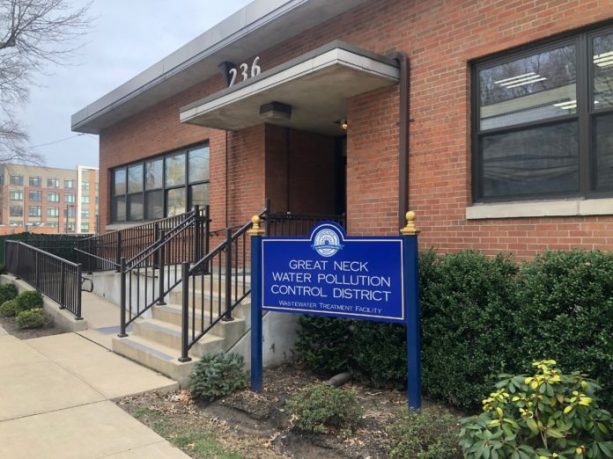The Great Neck Water Pollution Control District touted its prevention of excess nitrogen from entering the Manhasset Bay on Monday.
In a news release, district officials said nitrogen removal as a result of its operations, investments and environmental consciousness has “far exceeded” the expectations from the state. Officials said the district has kept more than 217,000 pounds of nitrogen from entering the bay since 2014.
The need to avoid excess nitrogen in bodies of water such as the Manhasset Bay is due to the far-reaching impacts it has, along with phosphorus, on ecosystems. The combination of too much nitrogen and phosphorus allows algae to grow faster than the ecosystems can handle, according to the U.S. Environmental Protection Agency.
“Reducing nitrogen levels is vital to the health of Manhasset Bay,” district Commissioner Patty Katz said. “It is our aim to continue to find ways to minimize nitrogen discharge through advanced technology and performance proficiency.”
The rapid growth of algae throughout a body of water can result in a decrease in oxygen needed for other aquatic wildlife to survive and negatively impact food resources and water quality. An increase in some algae can also increase bacterial growth and toxins that can make humans sick if they come in contact with the water, according to the agency.
District Chairman Steve Reiter said the main goal for the organization, which serves more than 25,000 residents and businesses, is to prioritize the health of residents and conserve the environment.
“As a waterfront community, it is vital that we limit the amount of nitrogen that goes into our natural environment, and we are proud to say that the GNWPCD does so in ways that far exceed expectations,” Reiter said. “Our treatment facility is always running efficiently and effectively, and this is a testament to the hard work of our employees and superintendent.”
After updating the treatment facility several years ago, the district is now able to treat waste and remove nitrogen at a much higher level. The district has also eliminated septic tank usage throughout the district by connecting businesses and residential homes. The district has connected the Americana Shopping Center to its system.
Officials said the district also conducted sewer studies for the Plandome Road business district and other homes, along with planning a sewer feasibility study for parts of Great Neck Estates and Harbor Hills.
Senate Majority Leader Chuck Schumer (D-NY) announced last week that more than $100 million in federal funds would be used to reduce nitrogen levels and protect the Long Island Sound watershed.
Schumer said the five years of federal funding will also restore and protect wildlife ecosystems and fishing industries, and diminish the negative impacts of climate change.

